How to get energy without caffeine
Posted on
If you’re looking to maintain good energy levels throughout the day, but don’t want to (or can’t) consume caffeine for that boost, then we have some ideas that might help. Read on to learn how to get energy without caffeine and why you might want to avoid it as an energy source.
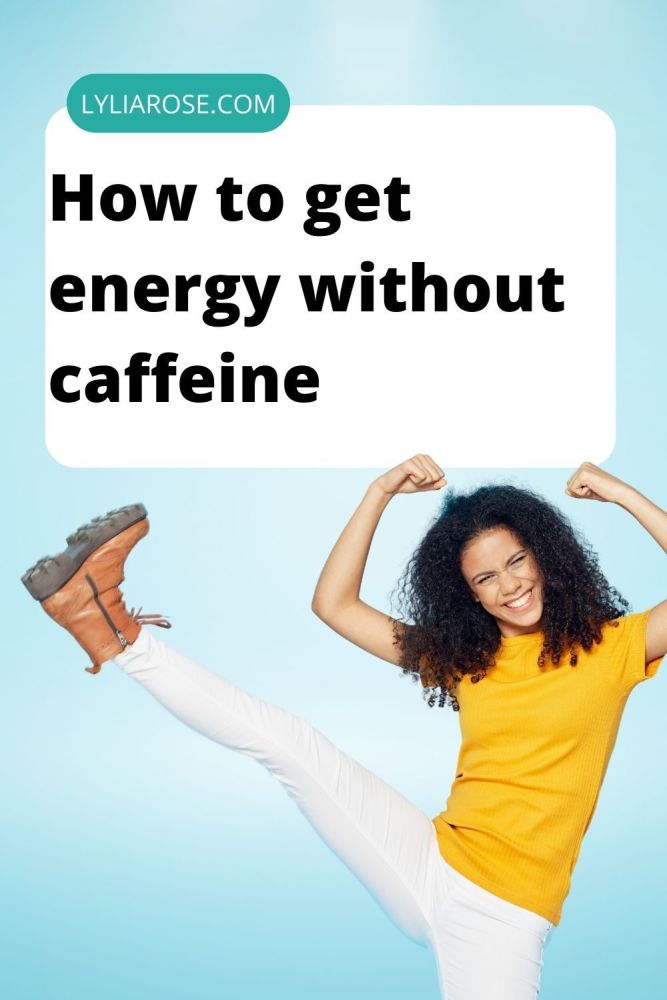
The positives and negatives of caffeine
Caffeine is one of the most popular stimulants in the world today. It’s cheap, easily accessible, quick to make and makes people feel more alert and energetic. It’s found in a number of drinks and food including coffee, tea, soft drinks and chocolate.
Caffeine does however have its drawbacks. Some people experience unwanted side effects such as insomnia or headaches after consuming it. Other side effects include an increase in blood pressure, anxiety, laxative effects and an increased urgency to urinate.
Caffeine can also have the opposite effect of an energy boost, caused by rebound fatigue after the caffeine levels in the system fall. The desire to have that boost in energy again can cause people to consume more, which can lead to an addiction.
The side effects can range from mild to severe depending on the person’s sensitivity to caffeine and the amount of caffeine consumed. So, there is no surprise people are looking for alternatives to caffeine for that boost in energy.
How to boost energy levels throughout the day without caffeine
Feeling energised during the day should be a natural part of life, but many of our lifestyles force us into unnatural situations. Making a few simple changes can positively boost our energy, happiness and overall outlook on life. What we eat and what we do will all have an impact on these levels.
If you’re always feeling lethargic and lacking energy, there are plenty of ways to energise without caffeine. We can focus on five main areas when looking to maintain our energy throughout the day. These are:
-
Food and drink
-
Exercise
-
Nature
-
Rest
-
Meditation
When we combine a number of these together the need for stimulants such as coffee completely disappears. Our bodies become naturally energetic.
First, let's explore some of the best foods to boost our energy.
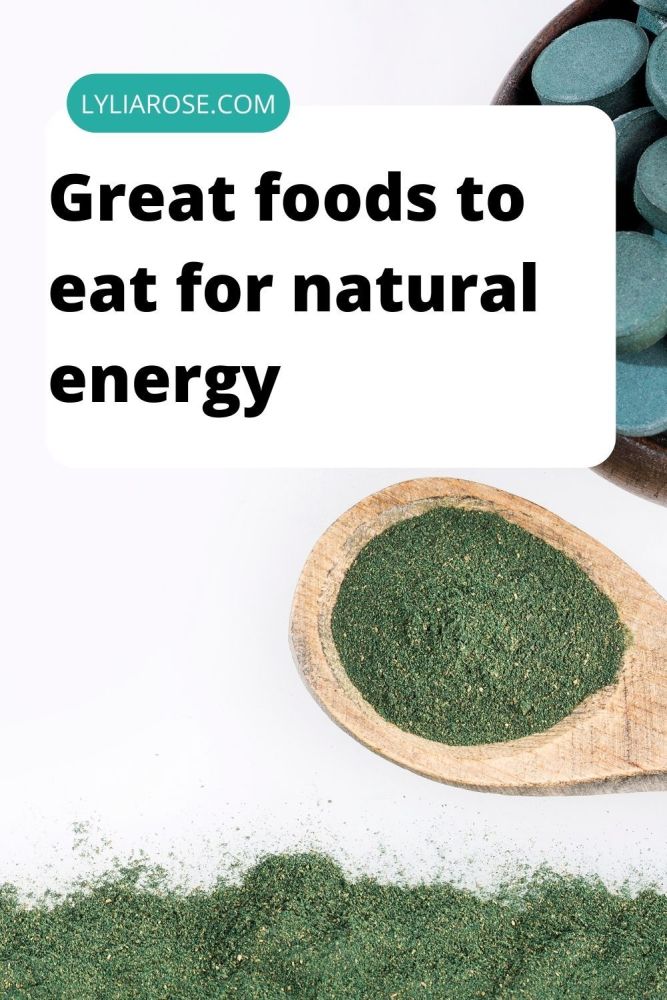
-
Great foods to eat for natural energy
Avocado
Starting your day with the right breakfast will make a difference in your energy levels. Avocados are a great source of healthy fats, which are necessary for our diet. They have a high monounsaturated fat content and contain no cholesterol. They also contain several important vitamins and minerals, including potassium, folate, vitamin K, vitamin C, vitamin B6 and fibre. Each of these aid in an efficient body metabolism which in turn boosts our energy. Try avocado on toast or an avocado smoothie for breakfast for that morning booster.
Bananas
Bananas are a great source of energy because they contain a lot of potassium and carbohydrates. Bananas provide instant energy to your body, which is why they are often used in sports drinks and other products. If you find yourself lagging in energy a quick banana can give you that quick energy boost.
Seeds
Seeds can be a great source of energy as they are rich sources of fatty acids and fibre. They also make for a great mid-morning or afternoon snack. Seeds can be sprinkled on salads, mixed into cereal or enjoyed on their own. Here are some of our favourites:
-
Pumpkin seeds
Pumpkin seeds contain iron and magnesium which can help to improve your stamina and reduce fatigue. They also contain omega-3 fatty acids, which can help lower the risk of heart disease and stroke. They have many other health benefits due to the number of nutrients found which include:
-
Fibre: 1.7 grams
-
Carbs: 5 grams
-
Protein: 7 grams
-
Fat: 13 grams (6 of which are omega-6s)
-
Vitamin K: 18% of the RDI
-
Phosphorus: 33% of the RDI
-
Manganese: 42% of the RDI
-
Magnesium: 37% of the RDI
-
Iron: 23% of the RDI
-
Zinc: 14% of the RDI
-
Copper: 19% of the RDI
Source: Healthline
-
Hemp seeds
Hemp seeds are a great source of protein and minerals that can give you an energy boost, which is why they are often used in vegan diets. They contain all the essential amino acids and fatty acids, as well as vitamin B1 (thiamine), vitamin B2 (riboflavin), vitamin D, iron, magnesium, phosphorus, potassium, zinc and other nutrients.
Hemp is a popular health food item for energy production, but they also have many other health benefits. They can help relieve skin complaints such as psoriasis, reduce symptoms of PMS and even aid digestion, allowing you to get on with your day.
Many people are confused when they hear the word hemp as they associate it with cannabis and getting high!
Well, hemp and marijuana are actually both from cannabis plants, but from different varieties. The main difference is hemp plants contain less than 0.2% THC which is the psychoactive compound found in much larger amounts in marijuana plants.
The terms hemp seeds and cannabis seeds are sometimes used interchangeably with one another, but when shopping in natural health stores or the whole foods section at supermarkets, you will be looking for ‘hemp seeds’, ‘shelled hemp seeds’ or ‘hemp hearts’ on the packaging.
Cannabis seeds might refer to marijuana seeds when shopping online. These seeds won’t get you high and are full of nutrients too. It’s when you grow the marijuana plants and they flower that the higher levels of THC are produced. This is not legal in most countries, but some people do collect the seeds as collector items. You can buy high quality seeds at SensorySeeds for such a purpose, but if you want to eat seeds for health benefits and energy then be sure to search for shelled hemp seeds when shopping online.
-
Flax seeds
Flax seeds are a great source of omega-3 fatty acids, which are essential for a healthy brain. They also have high levels of lignans, which help to reduce inflammation in the body and improve the immune system. As they are also a great source of protein and fibre it is a good idea to add them to your diet if you want to increase your energy levels.
Flax seeds are used as a dietary supplement to help prevent diabetes, lower cholesterol, control constipation and several other conditions.
-
Chia seeds
Like the other seeds in this list, chia seeds are an excellent source of energy because they are rich in omega-3 fatty acids, protein, fibre, antioxidants, and minerals. They are also rich in minerals like calcium and magnesium which help with muscle function.
Chia seeds can be eaten raw but more often they are diluted in liquid which turns them into a gel-like substance. This can be useful for making puddings or thickening sauces. Many people add chia to their diets to help with weight loss as it can help you feel fuller, more quickly.
Vitamin B12-rich foods
B12 is an essential vitamin that the body needs to function correctly. Vitamin B12 is a water-soluble vitamin that is needed for DNA synthesis, and the formation of red blood cells. It also helps to maintain healthy nerve cells and the production of energy from food. Here are some great foods that contain B12:
-
Spirulina
Spirulina is one of the most popular superfoods in the world. It is high in protein, contains essential fatty acids, and has a variety of other nutrients. It is said to be one of the most nutrient-dense foods on the planet which is why it’s classed as one of the ‘super’ superfoods. It’s all the nutrients within the food that help the body’s functions perform at their best. Add a scoop of spirulina powder to your morning smoothie for that super boost you're looking for.
-
Cremini Mushrooms
Cremini mushrooms are considered one of the healthiest foods in the world. They are rich in iron, potassium, folate, and niacin. They also contain a lot of B vitamins and selenium which are essential for energy production. But what are they?
“Cremini mushrooms are at the middle stage of maturity, browner than the familiar white mushroom, but not quite as mature as the large portobello. For this reason, you may also hear creminis referred to as "baby bellas," or "baby portobellos."” Source – All Recipies
-
Marmite
Marmite is a spread made from yeast extract. It is high in B vitamins, especially niacin and riboflavin, which are essential for converting food into energy. It’s most commonly found in the UK and Ireland and used as spreads on toast or added to soups for flavour.
Foods to avoid if you need more energy
While most foods provide energy, the ones above focus on sustained energy, which is the energy that is not immediately used by the body and can be used to maintain a steady level of activity. The following foods may be suitable for short boosts in energy but are generally considered bad and non-essential for our bodies. Foods to avoid include:
-
Fast foods or fried foods
-
Sugary cereals
-
Packaged snacks and candy bars
-
Baked sweets such as cakes and cupcakes
Change your eating habits to get more energy
By changing our diet we can boost our body's ability to function more efficiently, helping them process essential vitamins and minerals to release energy throughout the day.
Another thing that can help this release of energy is to eat smaller portions more regularly. When we eat large meals our body is forced to process big quantities of food which can put a strain on it.
When we eat smaller portions of high-energy-producing foods we can get that release of natural energy throughout the day. Try eating smaller meals with plenty of healthy snacks in between.
Keep hydrated to reduce fatigue
Water is essentially important for our bodies because it helps us regulate body temperature, keep us hydrated, and flush out toxins. The human body is made up of 60% water and it is vital for every bodily function. If we don’t have enough water in our bodies it can lead to reduced motivation and increased fatigue. It’s especially useful for exercise when perspiration is more common.
Aim for 8 small glasses (150ml) of water a day or the equivalent of 1.2 litres a day.
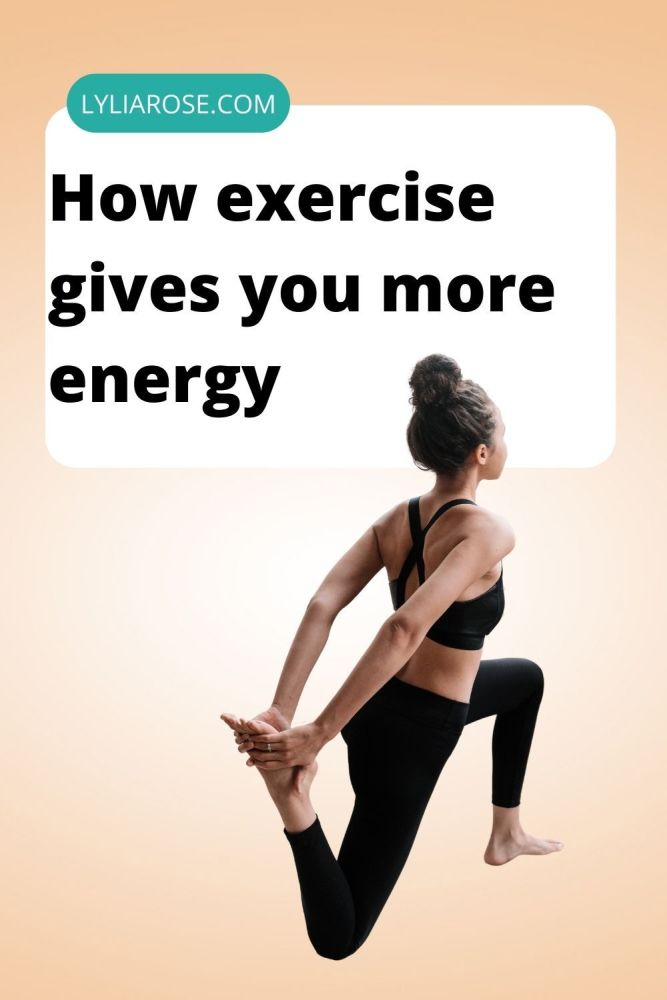
-
How exercise gives you more energy
Exercise is not just about weight loss. It’s also about improving your mental health, boosting your energy levels and improving your mood. Cardiovascular exercise is one of the best and may include running, cycling, swimming, and other faster-moving sports.
The benefits of cardiovascular exercise are numerous. It improves your mood by releasing endorphins in your brain. It boosts your energy levels by increasing oxygen to your tissues and muscles and can also help build a strong heart and lungs which will help you live longer.
Whilst cardio exercise is the best for your body it can also be very beneficial to include slower forms of exercise in your daily routine. Walking, yoga, climbing and anything else where you are actively moving around will help increase blood flow, which in turn provides an increase in energy. There are lots of ways to fit exercise into a busy schedule and it will stop you feeling so tired.
If you have been out of practise for a while it can take a little time to build up a suitable level of energy from exercise. But stick with it daily and you will start to feel better within a matter of days.
Aim for at least 30 minutes of active exercise every day for increased energy output. Morning runs are a great start to your day and lunchtime walks will help keep you motivated and focused throughout the day.
A good stretch first thing in the morning is great to get the blood flowing and energise your body in the morning. Yoga is great for mental health and relaxing, but it can also be a great way to get motivated for the day and feel more awake when you first get out of bed.
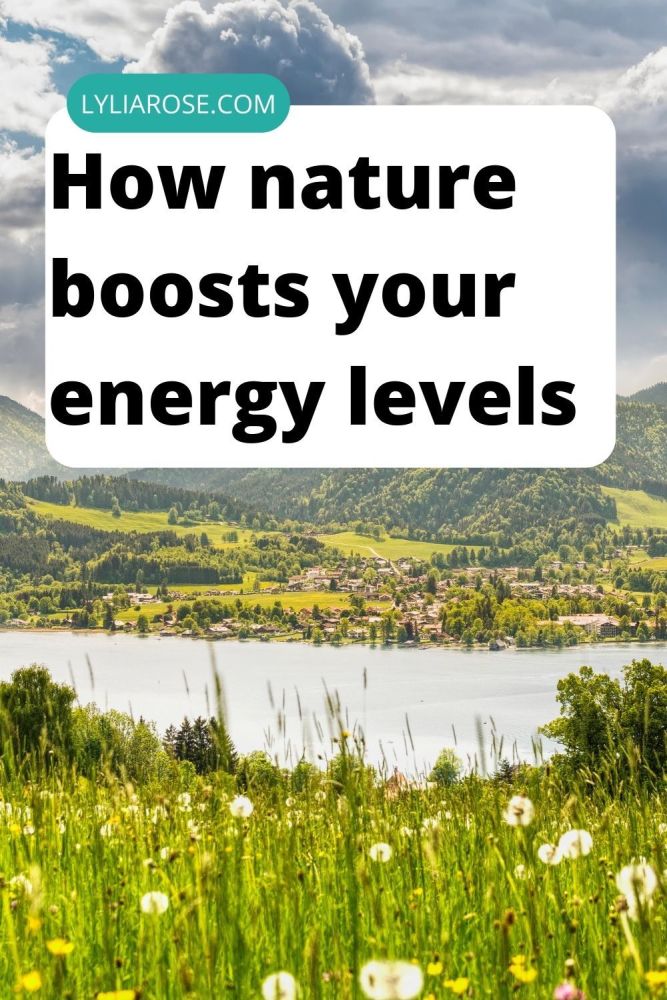
-
How nature boosts your energy levels
Being in nature can have a very positive effect on our body and mind. The fresh air, the natural sunlight and the environment all help reduce stress, blood pressure and muscle tension whilst helping to improve breathing which helps increase energy.
Here are some of the ways to use nature to increase energy levels:
Fresh air
The body needs fresh air to function properly. It is an essential factor in the process of releasing oxygen and carbon dioxide. Breathing in the fresh air will increase the amount of oxygen that is released into your blood, which will make you feel more energized and alive.
Sunlight
Sunlight is a natural source of energy. It provides the body with vitamin D, which is an important hormone that helps to regulate mood and energy levels. The body converts sunlight into vitamin D as it absorbs the UV rays.
Sunlight also helps to boost energy levels by increasing the production of serotonin - a chemical that is associated with feelings of happiness and well-being. The more we get the better we feel.
Cold water swimming
If you have access to cold water, whether it’s in a lake, river or sea then take advantage of this first thing in the morning to wake you up and feel revitalised.
Cold water swimming is not just a trend, it has been around for centuries. It has been used by athletes, military personnel, and even the ancient Greeks and Romans to improve their performance, body and mind.
Cold water can help you with many things including boosting your immune system and improving your mood. It’s a low-impact exercise that can help us to improve our energy levels, boost our metabolism and increase body temperature.
If you don’t have access to natural cold water you can start the day with a cold shower or bath to get your day off to the best start.
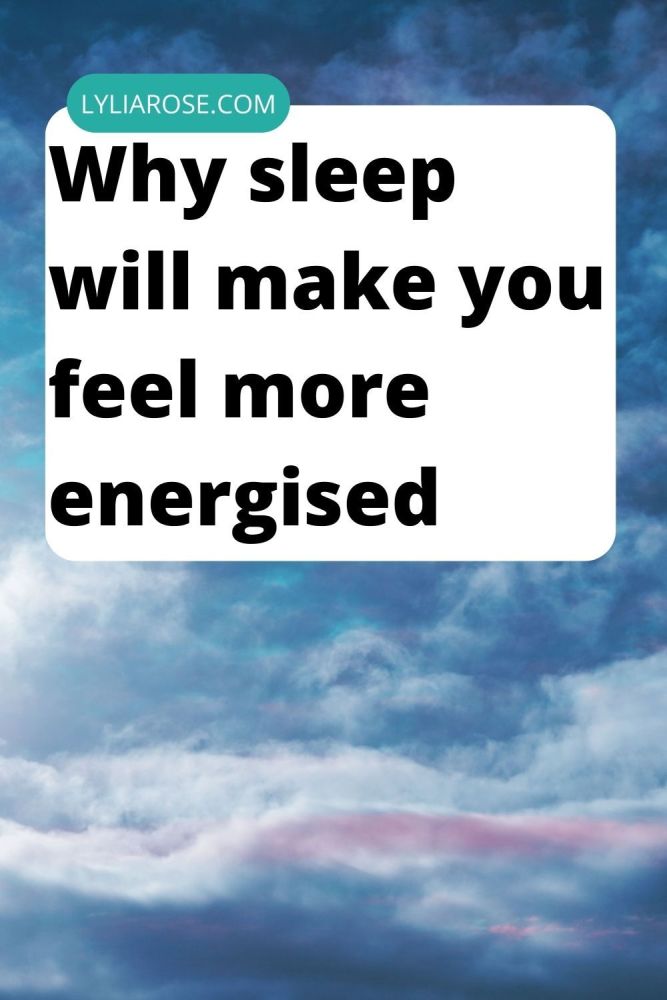
-
Get enough sleep to feel more energised
High energy levels are predominantly seen in those who take time to rest and sleep properly. With the right amount of rest, our bodies can perform better during the active parts of our day. But how does sleep work and why is it so important?
Sleep is a vital part of our lives. It’s the time when our body repairs itself, rebuilds muscle and strengthens the immune system. The time we spend sleeping can have a major effect on how well we recover from illness or injury, as well as how much energy we have throughout the day.
A good night’s sleep helps to improve our energy levels. We are less likely to feel tired and more likely to be productive. Sleep is essential for physical regeneration because it allows the body to repair itself and replenish its energy levels.
The quantity and quality of sleep we get can affect how we feel in general. Not only does a good rest help us to feel more refreshed and energized after a long day, but it also helps to regulate our hormones and maintain healthy brain activity. If you don't get enough sleep, you'll feel tired and irritable all day long. Lack of sleep can also lead to weight gain, heart disease, depression and other health problems that will in turn reduce energy levels.
There are lots of ways to improve your quality of sleep. For example, you can learn how to change your bedroom setup for better sleep. Going to bed at the same time each night and getting up at the same time each morning is recommended so the body has a sleep routine. Minimise screen use and bright lights at least one hour before bed. It’s also very important to get at least seven hours of sleep per night. Sleep expert Matthew Walker also explains how sleep after alcohol or marijuana is not restorative:
-
Regularly practising meditation can improve energy levels
Meditation is a great way to help your body. It helps with weight loss, it boosts your energy and it can help you reduce your stress levels. Meditation also improves memory and concentration.
Some people find that meditation is just not for them, but there are many different types of meditation out there. You may have to try a few different methods before you find one that works for you.
There are many different types of meditation, but they all share one thing in common: they all involve some sort of mental training. Some types of meditation focus on breathing and body awareness; others involve focusing on thoughts, feelings or sensations; and others involve following an object such as a candle flame or sound.
A breathing exercise is a physical technique that helps to reduce stress levels and calm the mind. It also helps to regulate the body’s energy flow, boost metabolism, and improve overall health.
Breathing exercises also help with relaxation techniques and come in different forms such as yoga or meditation. Yoga includes deep breathing as one of its main components while meditation is just focused on deep breathing without any physical poses involved.
Conclusion
Hopefully, this post has provided you with a number of suitable things that you can try to increase your energy levels without relying on caffeine. You don’t have to do them all but you will find that when you find a daily/weekly routine with many of these you will see a vast improvement.
Whilst this article is focused on boosting your energy you will also see a change in your mood, ability to focus, overall happiness and health in general.
The ideal weekday for us would look something like this:
-
Kick off the day with a quick 30-minute run
-
Followed by a cold shower or swim
-
Continue with a small nutrient-rich breakfast
-
Snack on nuts and seeds
-
A light healthy lunch
-
A 15-20 minute stroll in nature or around the park
-
Snack of fruit
-
A decent evening meal with a good source of protein and fibre
-
20-minute meditation or yoga session
-
Spending time with loved ones
-
A good quality 8-hour sleep
Repeat every day during the week with 1.2 litres of water daily.
The ideal weekend for us would include:
-
A long nature walk in the woods, up the mountains or along the coast
-
Game of tennis
-
Bike ride
-
Organise/tidy the house
-
Spend time with friends and family
-
Gardening
-
DIY
Everyone will be slightly different but it’s important to reduce the amount of TV and video games we consume. An active lifestyle with a good diet is going to keep our energy levels at a sustainable level. The more exercise we get the more energy our body will provide. And 7-8 hours of quality sleep per night will ensure our body is refreshed and reenergised for the next day.

